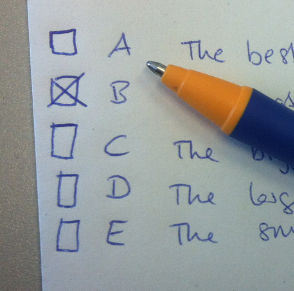
Will getting it wrong help or hinder future learning?
A study shows that unsuccessful retrieval attempts enhance subsequent learning.
I’ve talked about how testing drives learning a while back, and today’s post is on a similar topic. If testing drives learning, what happens when you don’t know the right answer on a test – will it help or hinder future learning?
In the paper “Unsuccessful retrieval attempts enhance subsequent learning” by Kornell, Hays and Bjork, students are tested on material where they can’t possibly succeed at the first attempt, for example by asking fictional general-knowledge questions (like what peace treaty ended a fictional war) or questions where a correct answer, based on a weak association, is unlikely (and correct answers were excluded from the analyses).
Two cases are compared: the test condition, where participants try to answer the questions and are only shown the answers afterwards, and the read-only condition, where the participants are shown questions and answers at the same time. In both cases, unsuccessful retrieval attempts enhanced learning.
The authors conclude that “These results demonstrate that retrieval attempts enhance future learning; they also suggest that taking challenging tests—instead of avoiding errors—may be one key to effective learning.” They comment on the practical implications of this research and recommend that both educators and learners should introduce challenging tests as learning events, even though initially the likelihood of the wrong answer being given is quite hight. Under the crucial condition that feedback is being given, this will help learning in the long run.
There are practical implications of this for my work, too. For example results of this study should help dissipate fears that pre-tests (which we would like to pose in order to determine the learning gain throughout a course), where students likely will not likely know most of the answers, will make students remember the wrong answers they gave. Or, similarly, that clicker questions will cement the wrong answers in the students’ memories. Or even that asking questions during a lecture without immediately providing the correct solution will have negative effects on student learning. Quite the contrary, the study shows: “the attempt to retrieve the answer may enhance the activation of these related concepts, which may, in turn, create a fertile context for encoding the answer when it is presented.”